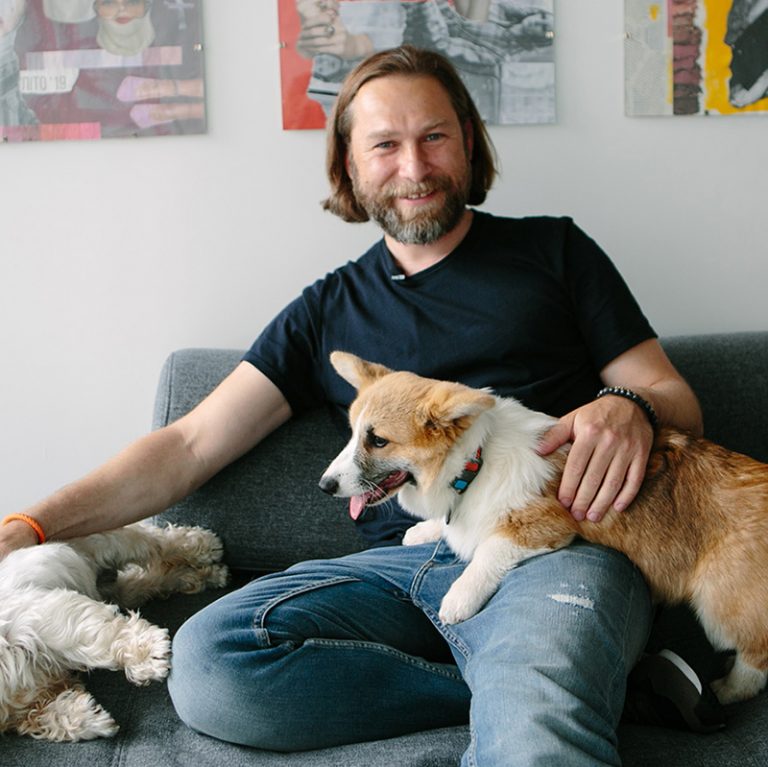Kormotech is a Lviv family-owned company, one of the world’s top 70 best producers of dog and cat food. They export 20 per cent of production, producing pet food at two factories in Ukraine and one in Lithuania. Changing the perception of pet food in Ukraine is the ambitious goal pursued by the head of the company, Rostyslav Vovk.
The story of Kormotech continues a new series about “Exporters”. We are telling the stories of famous Ukrainian companies that have achieved success abroad. We analyse their cases to multiply the positive experience of advancing a high-quality Ukrainian product on world markets.
The pet food business has existed in Ukraine for two decades. Until the 2000s, Ukrainians’ need for pet food was 100 per cent satisfied by importers from Europe and the USA where the industry has over 150 years of history. Nowadays, the domestic market has a few significant foreign producers competing with each other, and about ten Ukrainian producers, among whom the most food is sold by Kormotech — 60,000 tons per year.

Finding the niche
The Lviv Kormotech office is close to the city centre. It is where deals are made, innovative products are born, and social initiatives are formed. The office is run by Rostyslav Vovk. He is a man in his forties with blond hair and an open smile. No suits or officiousness. It’s hard to believe that he is a co-owner and CEO of the company that is the fifth fastest growing pet food company in the world.
Rostyslav started his career far away from the pet food business, he graduated from the Institute of Banking and after one day working in a bank realized it was not for him. From the age of 16, he worked at his father’s yeast manufacturing plant — first as a loader, then as a sales manager and as an innovative bakery centre consultant. While still a student, he ran several small businesses simultaneously, such as logistics shipping. Right then Rostyslav realized that he was talented in entrepreneurship:
“I need to create something, to go somewhere, to move all the time. In 2003, at the family council, I was offered the opportunity to build a fodder factory. Of course I agreed. I have been stuck here for 20 years.”
Lviv Kormotech company has been active on the Ukrainian pet food market since 2003. Its portfolio includes four commercial products of different classes, from standard to super-premium: “Woof!”, “Meow!”, “Club 4 Paws”, and “Optimeal”. It also has partner products made to order by a particular retail chain (private label).
In 2000, Rostyslav’s father, Orest Vovk, who founded Enzym, a baker’s yeast company in the 1990s, came up with the idea that became the start of the company. He felt, that less bread was being eaten on the market. He decided to find the market which was growing globally, the product that would be made necessary with added value (so as not to sell a raw material, but a product itself), one that had no alternatives in Ukraine, and one that involved highly intellectual labour. The pet food market turned out to be an ideal place for just such a development.
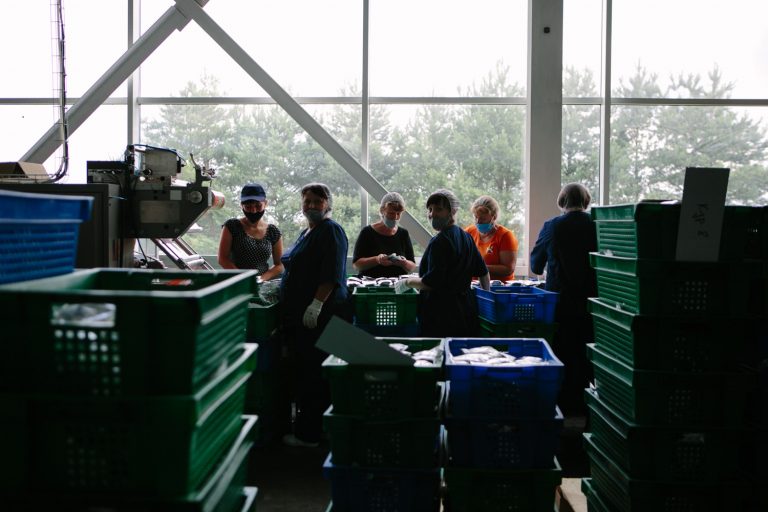
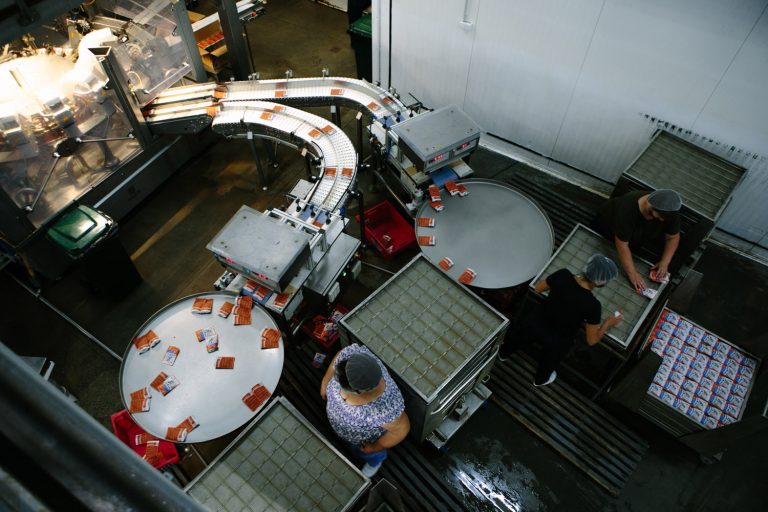
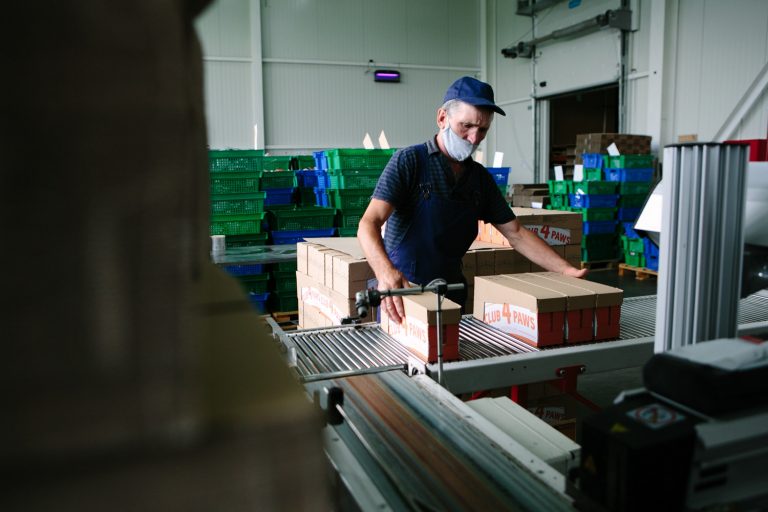
slideshow
That’s how the Kormotech history began, says Rostyslav. Officially, the company was established in 2003. Then, he says, there were only foreign brands on shop shelves, and there were no specialists in Ukraine who would know how to make fodder. Rostyslav started his business from scratch: he trained employees, looked for suppliers, built the factory (production of dry food was established in 2005), and hired nutritionists to develop the first recipes. His colleagues from the USA helped him a lot, they also created a business model for the company.
Rostyslav says that they faced the first difficulties at the beginning of production, because the business model of the American company was not based on Ukrainian studies, but on the American market realities. That’s why the first Kormotech food was coloured: a red pellet — meat, a green one — greens, and an orange one — with added vegetables, such as carrots. And also the product was wrapped in a pastel package as it was popular then in the USA and Europe.
Right then, Rostyslav understood that “copying doesn’t work in business”, because Ukrainians associate colored foods with artificial dyes. That’s why after half a year Kormotech took all its products back. And so, Rostyslav says, Kormotech history includes a long process of research, attempts and mistakes, overcoming the client’s mistrust of a new domestic product, and even working without profit because of refusing to compromise the material quality:
“We made no concessions to quality, because you cannot make a bad product: a dog or a cat understands that it is made of something bad or spoiled.”
Before coming to Ukrainian supermarkets, pet food had been sold in vet shops. Only in 2008, manufacturing representatives signed a contract with one of the largest networks in Ukraine, and along with the pet food made under this chain brand, it was agreed to sell Kormotech products:
“We asked for part of the shelf space for our own brands. They allowed this, it was five percent of a shelf at that time. Since then we have begun making such steps into supermarket networks. Our products now take not five but more than 30 percent of the shelves.”

Volume of production increased, and the team expanded too. At first, five people worked in Kormotech: the director, a chief engineer, a quality manager, a consultant and an interpreter. After the launch of the factory and the first sales, several dozen more employees joined the team. Kormotech Ukrainian and foreign offices now number 1,000 people.
At the Lviv office you realize at once that the company is animal-friendly: in the corner there is a “paw washer” for dogs and cats, the former, by the way, walk freely through the office. Eighty-five people work at this office including veterans, tender department officers, designers, lawyers, product-managers, and sales teams which have clientelle in Ukraine, Western Europe and South America among other places.
In 2015, the company opened a research and development department that is responsible for new formulas. This is not taught in Ukraine, so the executive is proud that the company has educated its specialists. The company now has a complete recipe development process. The manager sees strategic value in the development department. He says, “These are people who work for the future.”
“Their work may not be seen for six months, a year, a year and a half. Then we get a product that doesn’t exist in the world, or a product that has a clear competitive advantage that others don’t have.”
According to Rostyslav, most of the company’s top managers have gone through the ranks with the company — this makes it more comfortable for the team to work. This is why the company invests a lot in training: basic (e.g. English, office software, project management) and industry-specific.

About running a business in Ukraine
Rostyslav says the main goal of Kormotech is to change the relationship between people and animals by introducing owners and animals to a quality product. Now Kormotech is among the world’s top 70 pet food producers according to the international industry magazine PetfoodIndustry. Kormotech has three factories: two in Ukraine and one in Lithuania.
The bulk of production is concentrated in Ukraine. Ukrainian roots, according to Rostyslav, give the company a certain advantage. Understanding the Ukrainian mentality and the huge potential of the country, the manager sees room for opportunity and business development:
“This is a country that has a lot of highly educated and talented people. Here you can produce added-value products, not just raw materials, but one can engage in processing. You grow grain, add something to it, and process it. Profits and the future of all nations are built on this.”
But despite the considerable advantages of “playing on your own turf”, Rostyslav speaks of the obstacles to business in Ukraine, such as bureaucracy and gaps in the judicial system. However, he considers his business promising. He says, ”Over time, Kormotech will be able to change the attitude of Ukrainians (and with them Eastern Europeans) towards their pets — people will respect their emotions and consider their needs.” Rostyslav sees the business as a family business and is ready to devote his life to Kormotech:
“When you meet with partners from around the world at expos, you raise the brand of Ukraine a little, which really needs this promotion. That’s why it’s very important to me. Our mission is to produce affordable and high quality pet food. This is what we do; this is our core business.”
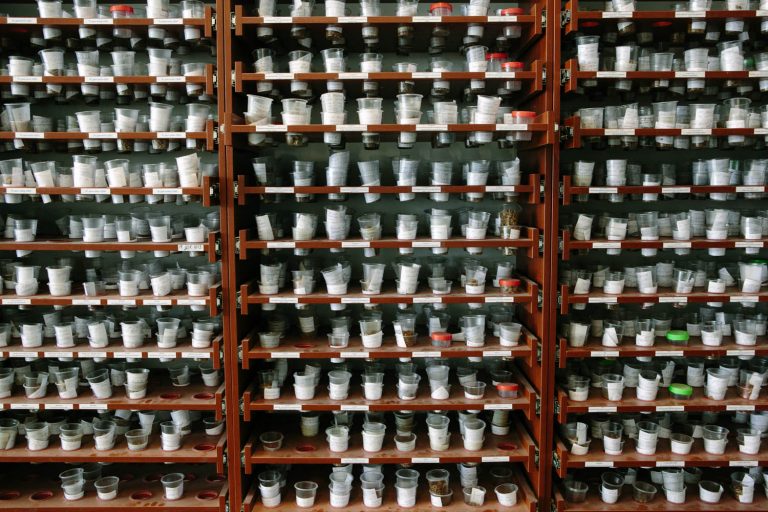
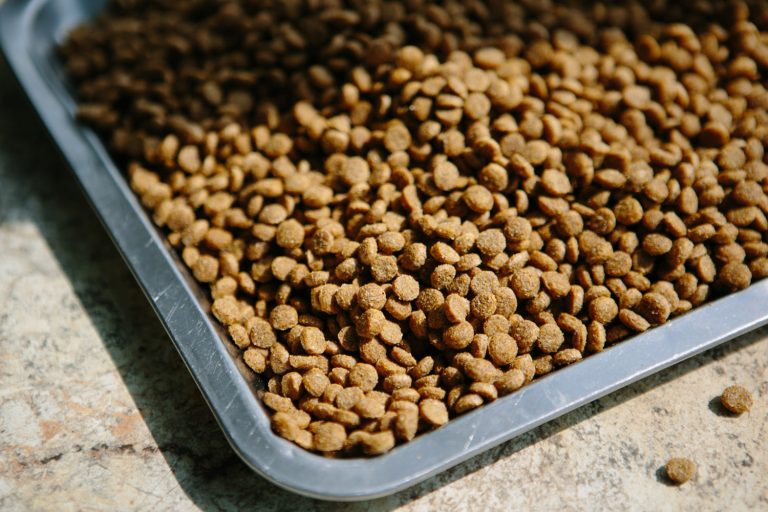
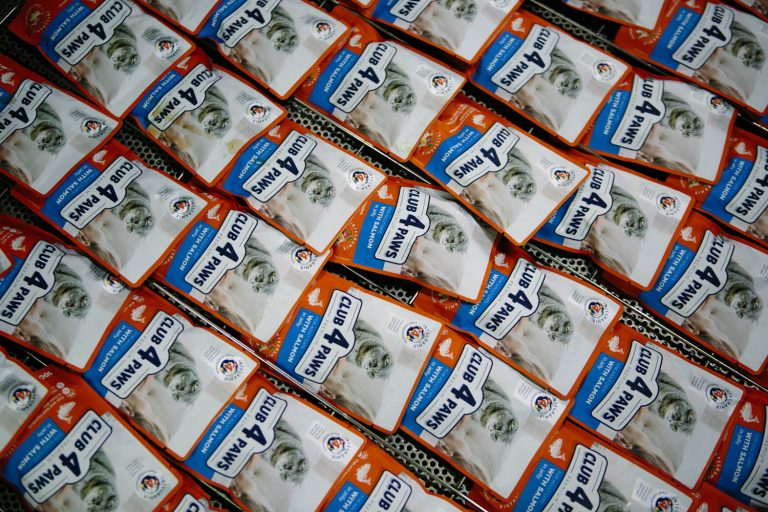
slideshow
What our pets are eating
Ihor Paraniak joined the company as an operator after opening the first factory. The man has worked at Kormotech for more than 15 years, and he is now director of production. He is responsible for everything: construction, production, quality, and the final product.
The company has two factories in the village of Prylbychi in Halychyna: one for the production of dry cat and dog food, and the other for the production of wet food.
Ihor says that the process of preparing pet food starts long before production. It’s all about the recipe. First of all, the necessary raw materials for the product must be found. The company buys them abroad; they say it is difficult to find a reliable supplier in Ukraine. Before concluding a contract with the supplier, they check it for about six months. Each batch of raw materials is monitored in a laboratory. After it is delivered to the factory, it undergoes quality control: microbiological, safety and nutritional indicators are all checked.
Some of Kormotech ration formulas contain up to 30 ingredients. Dry food is made from meat meal (pre-dried meat); wet food is made from fresh meat by-products (heart, liver). To improve the immunity of animals, various herbal ingredients are added: chamomile, thyme, ginger, ginseng, blueberries, and flax. About 200 formulas are used for dry production and 150-200 for wet feed. Each recipe covers a specific pet’s needs: for example, there is food for spayed cats, food for dogs with allergies, food for obese dogs, food for puppies, food for kittens, and food for elderly cats and dogs.

Previously, the company used the services of nutritionists from the US and Europe, but since 2009, Kormotech has been developing its own formulas: the product creation procedure takes 1-2 years. After sourcing raw materials, studying the needs of the animals and formulating the recipe, taste testing is carried out. Animal tasters (whose owners have signed an agreement with the company) receive two servings of feed each. Rostyslav explains that this is a safe process for the animals, as the feed is made from quality raw materials; the animal only evaluates the taste of the food. They take into account which food the pet chose first, how much and what kind of food it ate, and how it felt during the day.
“These palatability tests confirm that the animal likes our product. When an animal does not like a product, it simply will not eat it, so we make sure the product is tasty and nutritious for the pet.”
The main stages in the production of dry food are the extrusion and vacuum spraying processes. Extruders convert the dry, already mixed and ground raw material into dry feed pellets. The next step is when the vacuum spraying system coats the surface of the pellet with fat to saturate it with nutrients. During spraying, the dry pellets are poured inside the container, the air is pumped out — so a vacuum is created — then the fat is added. When the air fills the container again, the fat is pressed into the pellet and held in place securely. The dry food is packaged after the fat has been sprayed on.
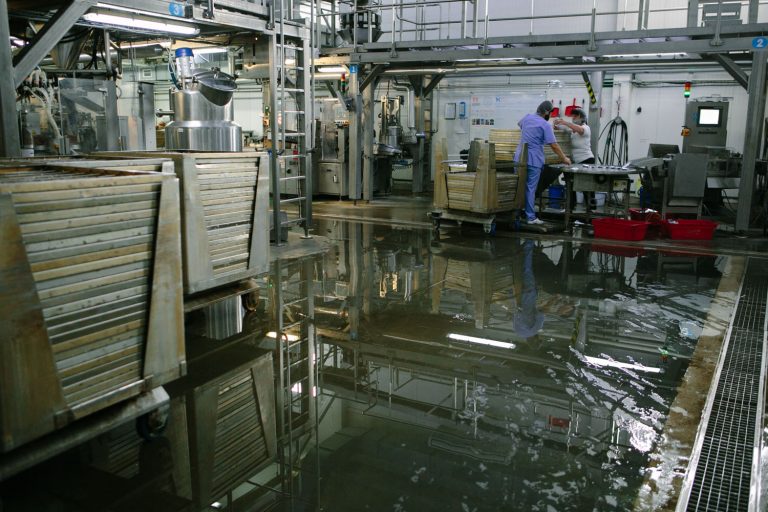
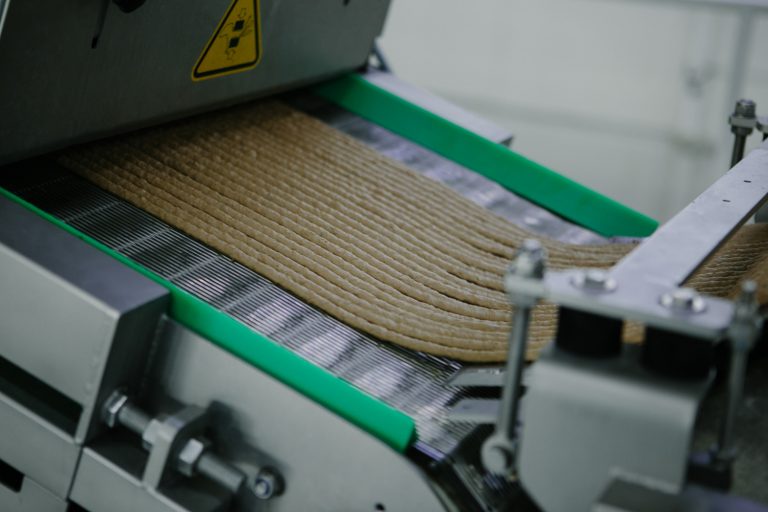
slideshow
The production of wet fodder is different. It begins with the processing of raw meat into an emulsion, which, after checking with metal detectors, is cooked in steam tunnels to retain the nutritional value of the formulation. The cooked meat pieces are fed to the multi-head feeders and then move on to the automated packaging line. Approximately 30 tonnes are produced per day. The packaged feed is then sterilised to guarantee it for up to two years.
To make sure it is sterilised, the company uses special ink, which changes colour to blue after the packaging has been sterilised. Only then do the packaged products go to the intermediate storage facility, from there they go to the distribution centre in the town of Horodok, and then on to other countries to be sold.
When comparing labour intensity, Ihor says wet feed production requires more human hands to manage, while the dry feed factory is more automated and four times more powerful than wet feed production.

The map provided by the heroes of the publication.
How to become an exporter
Rostyslav goes to the world map on the wall in the Lviv office, which shows the countries where Kormotech is present.
As of 2021, 20 percent of Kormotech sales are exports. The products are shipped to 36 countries, including Estonia, Latvia, Lithuania, Norway, Poland, Romania, the United States, France, and Chile. Rostyslav says they planned to export right away, because in Ukraine in the early 2000s, the pet food market was just beginning to develop.
Ukrainian owners are less likely to buy pet food, combining it with conventional food.
Rostyslav admits that feeding pets human food is a problem the team wants to solve once and for all. An animal — just like a human — needs a balanced diet. Feeding a pet “from the table”, makes these figures difficult to calculate, according to Kormotech. In addition, animals differ from humans in their nutrient requirements. Products popular among humans can be poorly digested by cats and dogs, thus provoking digestive disorders and weakening their immune systems.
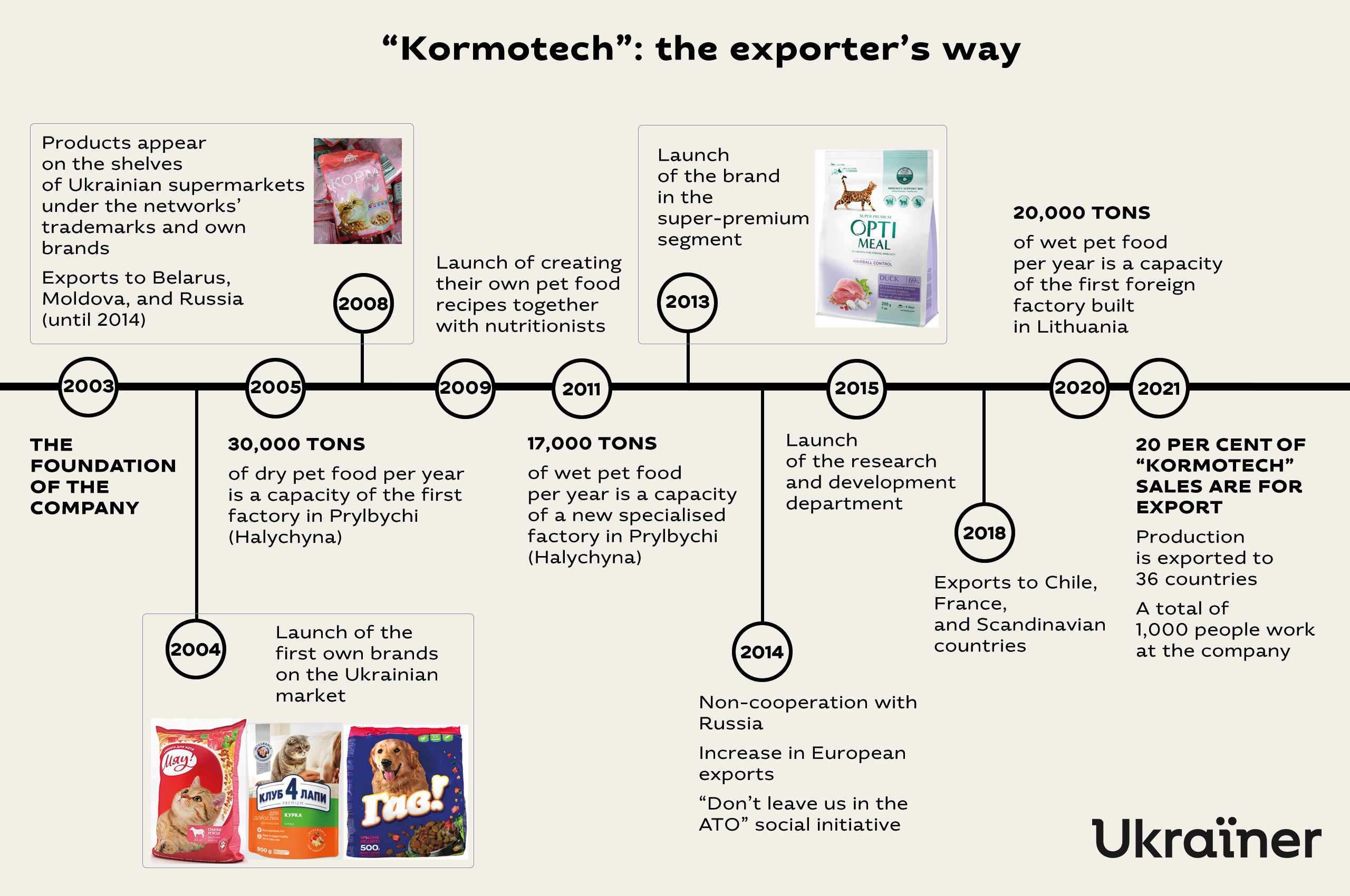
Since 2008, Kormotech pet food has been supplied in small batches to neighbouring countries where the company understood the specifics of the market — Belarus, Moldova and Russia (until 2014). The economic crisis of 2008, according to Rostyslav, was a turning point for the company, because they were able to offer the Ukrainian customer cheaper imported pet food for some time. In 2010, in order to consolidate the level of confidence in the domestic product, Kormotech decided to give tours of the company.
“We like to play the long game. This is also one of our values. We opened the doors to the factory and started showing it. We have conducted more than 3,000 tours over the past few years. And I think doing so has also opened some confidence in the producer for Ukrainians and foreigners.”
The company invited vets, pet shop owners, representatives of large supermarket chains, partners from Europe and the United States to tour their facilities. — This is how trust in Kormotech as a manufacturer and exporter was built.
According to Rostyslav, one should start exporting by understanding the potential of one’s company to produce the product that the importing country needs. The second important point is a constant presence at trade shows, because this way, according to the CEO of Kormotech, people start to trust the producer and understand that “you are here for the long term”. You can get valuable contacts at trade fairs (although it doesn’t always work out the first time).

The next step is to find the right partner who has the same values and believes in overall success, and ignite your team with the idea. However, cautions Rostyslav, exporting is a game of “long money”, so you need to understand the intricacies of the global market; if a producer wants to export pet food, one needs to obtain and, if necessary, present all possible quality certificates.
In 2014, the company withdrew from cooperation with Russia and refocused on the European market. Rostyslav recalls entering the French market as a good example of export. They found an agent who helped the company negotiate and win a tender for supplies to a hypermarket chain:
“We started producing the product under the chain’s own brand. And after working with them for a year and a half or two years, we agreed to introduce our own brand, “Optimeal”, and now we have been selling there for over a year. We are satisfied; they are satisfied. We are constantly growing.”
At the same time, Rostyslav recalls the company’s first failed attempt to enter the US market in 2018:
“We went there thinking that everything would be the same there as with us, that our product could easily be sold in the US: just write in English and change the weight from European to American. It really isn’t like that.”
The team then realised that the American client needs very different formulas and designs. That is why Rostyslav recommends going directly to the country, studying the client, communicating with partners and identifying their needs. Now Kormotech is preparing for a new product launch in the US. Rostyslav is confident that this time they will succeed.
In 2018, “Kormotech” started supplying feed to Chile. It took six months to prepare for the collaboration. After winning the tender, the team agreed on formulations, packaging design, and then made rations. In November, four containers of 43 tonnes of pet food left for South America.
Kormotech also managed to cope with the challenges of the COVID-19 pandemic. They stepped up online sales and looked for partners. They found in Norway the biggest online shop operating in the Scandinavian market. Rostyslav says that the cooperation agreement was preceded by long negotiations:
“The online shop was changing its partner at that time, i.e. it was bringing out a product produced by a large multinational company. We tried to persuade him for a long time that we could do it. Then our vet team finally persuaded him by telling him what our product was, what its key advantages were, what our concept was, and what its values were. By May we were already on sale in this online shop.”

Kormotech has an ambitious plan to become one of the 50 global industry leaders by 2023. In 2020, the company launched its first overseas wet feed factory in Lithuania to facilitate deliveries to Europe and Latin America.
From the very beginning, the company decided that the new factory would be built in one of the Baltic countries because they are logistically convenient: they have developed ports. At first, Kormotech chose Latvia and was already ready to conclude an agreement, but Lithuania made a more favourable offer. The factory was built in nine months. Modern high-tech equipment was installed: production processes are 90 percent automated. While the capacity of a similar factory in Ukraine produces the amount of 17,000 tons per year, the Lithuanian one makes 20,000 tons. In the near future, the company plans to automate the Ukrainian wet feed factory opened in 2011.
Rostyslav notes that it was very easy to launch a business in Lithuania as well as build a factory there. He adds that they managed to find a team in Lithuania that shares the company’s values.

Kormotech social initiatives
Social activities are an important part of Kormotech work, as the company not only produces fodder, but also aims to change attitudes towards pets. Today, there are more than 15 social projects, the implementation of which is the responsibility of Kateryna Kovaliuk, PR director of Kormotech.
One of the most important social initiatives is aimed at helping animals in the Ukrainian territories temporarily occupied by the Russian Federation.
This project of the company started in 2014, after the military aggression of the Russian Federation began in certain places in Ukraine. People left there, but many animals could not be evacuated. Kormotech donates food to volunteers, owners, and guardians of abandoned animals in the war zone, and advises veterinarians and animal protection workers. This initiative has grown into another project of Kormotech — cooperation with animal shelters and animal volunteers all over Ukraine. One such partner is the Lviv communal enterprise “Lev”. Every year, Kormotech donates 25 tonnes of fodder to the cats and dogs that LCE “Lev” is trying to find new families for. The partnership started in 2015, Kateryna recalls:
“I remember a new LCE director approaching us. He said: “Look, I came to this company, you are a Lviv company, we are a Lviv company. Our people cook some porridge with bones, it’s not a balanced meal. On the other hand, they spend a lot of time on all this, helping with the feed.”
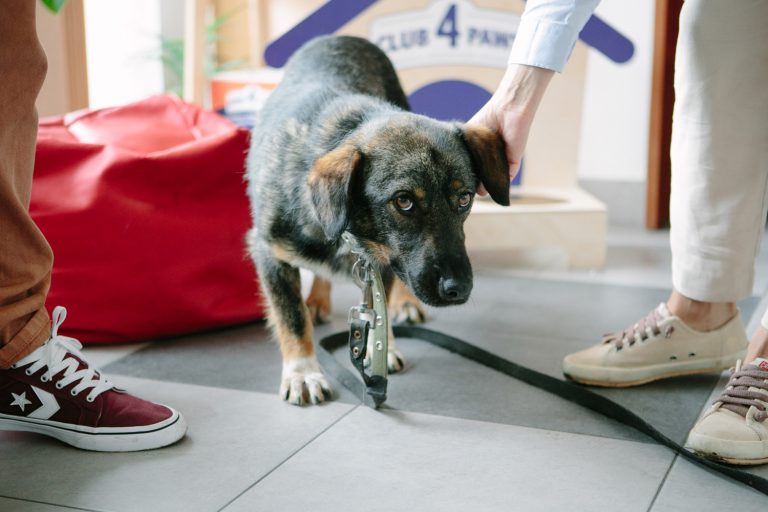
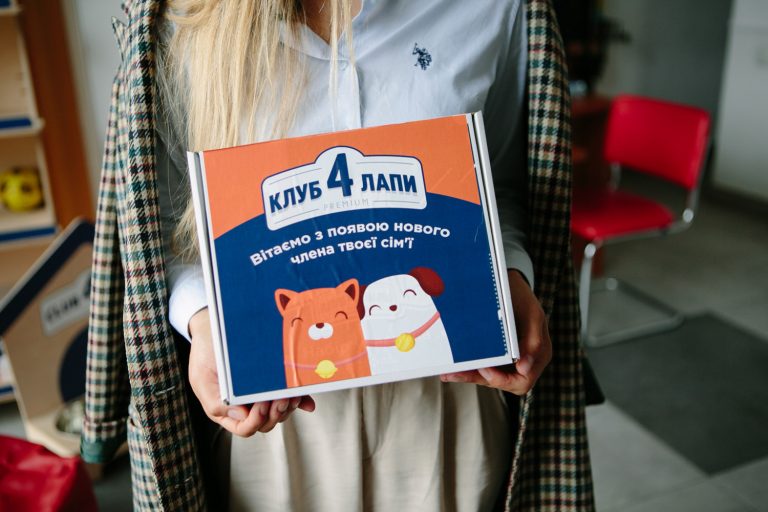
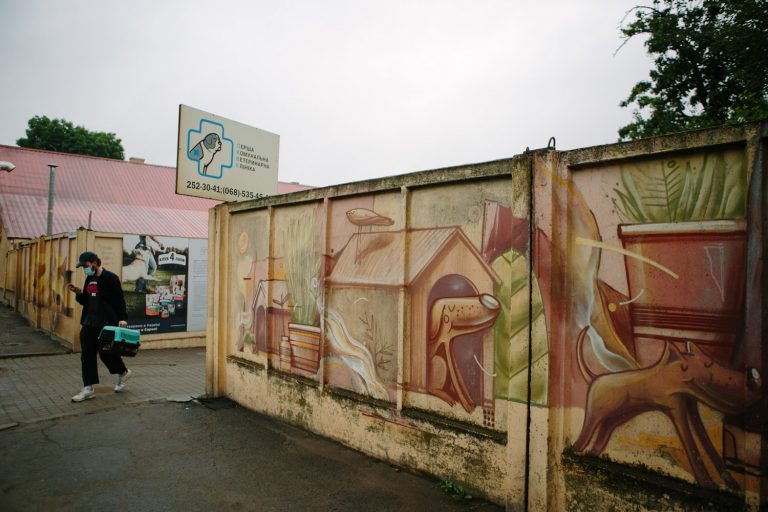
slideshow
In addition to assistance with food, Kormotech joins the second line of work of “Lev” shelter — adopting temporary shelter residents. The LCE “Lev” prioritises placing an animal with a family (for example, in 2019, 96 percent of the 500 dogs that were in the shelter found new families). The shelter understands that when people come to choose an animal, it must be healthy and well groomed. For this reason they have an animal clinic and a bathing centre where animals are bathed and groomed. In order to make sure that the family takes care of the pet, the Kormotech team has created a box, which is given to the adopting person.The box contains food for several days, instructions on how to prepare the house, and tips on how to take care of the pet.
A third, strategic area for Kormotech, education, is also focused on treating animals properly. In 2016, the company, together with the Lviv Department of Education, developed a course on “Humane Education”, which is taught by biology teachers after training at workshops developed by Kormotech specialists. The course consists of four lessons in the classroom (about the harmonious co-existence of humans and animals, the welfare of four-legged animals, and warnings against the consequences of irresponsible and cruel treatment of them) and one field lesson. In fact, the field trip is a lesson at the LCE “Lev”, a practical one. On the eve of the visit the children are given a special notebook that explains in detail how much time and resources a pet needs, the animals’ emotions, individual distance, and safe behaviour.
Kormotech believes that in families who have pets and treat them as companions, children receive a model of humanity, which then necessarily converts to the relationship of this child with other people:
“The presence of an animal makes people kinder, more empathic. Secondly, it’s difficult for shy children to make friends and the tactile touch of a cat or a dog translates into the child’s ability to get acquainted and make friends.”
In addition to exercise and outdoor walks that all people need, animals especially help those who are afraid to be alone by creating a feeling of safety and comfort. Kateryna also adds that it is recommended to get a pet for people who are prone to depression: the presence of an animal prevents people from withdrawing into themselves and thinking of something bad.
Andrii Pinchuk, head of the LCE, says that during a field trip, pupils meet animals to decide whether they can be responsible owners. Here the children see with their own eyes that the main reason for the appearance of stray animals is the abandonment of their own owners, and that pets are first and foremost a responsibility.
“The children are touched by this, and then their minds are changed, and they grow up with the basics of humane behaviour and, in the end, responsibility.”

Andrii believes that the cooperation between Kormotech and LCE “Lev” is a unique case, when a municipal structure closely cooperates with private business. Kateryna agrees and says that the ideal cooperation is when there is a triangle: the public, city and business.
“Perhaps one day someone will describe this case as the perfect interaction of this triangle, when the city is changed by the cooperation of the three parties. That’s how the stars have aligned — the right teams in both the shelter and the business, and the public figures we have here are very cool. We really are such a big family, we all love and support each other.”
Another social project, which Kormotech is proud of, is the Optimeal Expert School where representatives of the zoological market (shopkeepers, salespeople), cynologists, felinologists (cat kennel owners) can take additional training courses, and veterinary specialists can take advanced courses. The school, which started in Kyiv, is now expanding. The company has won a grant from the EBRD — the European Bank for Reconstruction and Development — and now analogues of the Optimeal Expert school may appear in other Ukrainian cities.

Since 2012, Kormotech has supported the international “Take Your Dog to Work” campaign, which was proposed in 1999, by representatives of Pet Sitters International (pet sitters are people who look after pets when their owners are away). According to the campaign, there is at least one day a year where people do not have to leave animals at home, but can instead take them to work. Dogs can be brought into the offices of Kormotech every day. Kateryna Kovaliuk shares her experience of working in a dog-friendly company: the staff often walk outside and conflicts are resolved easily — because there is a dog which can be petted.
“It happens more than once that we are in a meeting, we are trying to solve something serious. Then the door opens, Beri (Kateryna’s dog — ed.) runs in, sits down on a chair, and everyone smiles at once. Everything is solved more easily. A dog in the office creates quite the buzz.”
The company wants to involve Ukraine in a global initiative that encourages employers to make friends with dogs. As part of the “Paws in the Office” project, the team has set a goal to have 300 Ukrainian offices dog-friendly by the end of 2021, so that employees can take their dogs to work every day. Kormotech helps willing companies with everything they need and teaches them how to create an animal-friendly environment.

